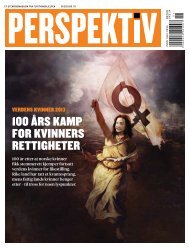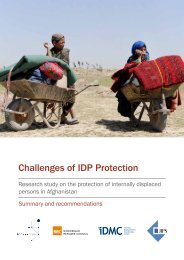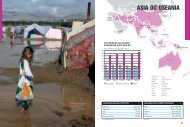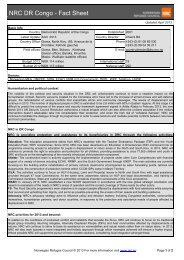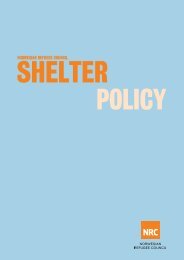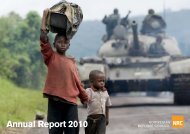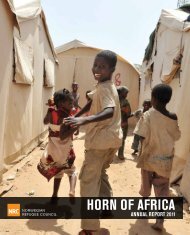TERMS OF REFERENCE Evaluation of NRC's country programme ...
TERMS OF REFERENCE Evaluation of NRC's country programme ...
TERMS OF REFERENCE Evaluation of NRC's country programme ...
You also want an ePaper? Increase the reach of your titles
YUMPU automatically turns print PDFs into web optimized ePapers that Google loves.
NRC doc 141717<br />
<strong>TERMS</strong> <strong>OF</strong> <strong>REFERENCE</strong><br />
<strong>Evaluation</strong><br />
<strong>of</strong> NRC’s <strong>country</strong> <strong>programme</strong> in Colombia<br />
Annex 1<br />
Project/Program: C<strong>OF</strong>Y1001<br />
Country:<br />
NRC Country Programme Colombia<br />
Period: January – March 2011<br />
Date last draft TOR: 30.09.2010<br />
A. Programme background<br />
1. CONTEXTUAL BACKGROUND<br />
Colombia continues to be affected by a four-decade-long armed conflict that results in forced<br />
displacement and human suffering. Extrajudicial executions, forced disappearances, forced displacement,<br />
forced evictions, land dispossession, forced recruitment <strong>of</strong> children, arbitrary detentions, torture and other<br />
cruel and inhumane or degrading treatment, like sexual violence, are occurring in the <strong>country</strong>. All parties<br />
to the conflict, including guerrilla groups and organized armed groups, new and emerging illegal armed<br />
groups and state security forces, are responsible to different degrees for forced displacement, human<br />
rights abuses and violations and breaches <strong>of</strong> international humanitarian law (e.g. forced recruitment <strong>of</strong><br />
minors, general and systematized practice <strong>of</strong> sexual violence, attacks on civil and medical targets,<br />
indiscriminate use <strong>of</strong> land mines etc.).<br />
The situation <strong>of</strong> forced displacement in Colombia is among the most serious in the world. According to the<br />
Government, since the mid-1990s, more than 3.2 million people have been displaced. On average, in the<br />
years between 2000 and 2009 more than 300,000 persons were forcibly displaced. In 2009, <strong>of</strong>ficial<br />
sources have put the figure at 126.000 displaced and reliable non-governmental sources have also<br />
observed a decrease, but put the numbers at 286.389 and the current and accumulated displacement<br />
figures to be close to 4.9 million.<br />
The humanitarian crisis and the phenomenon <strong>of</strong> forced displacement have continued in 2010, and in<br />
particular in those parts <strong>of</strong> the <strong>country</strong> where organized and other armed groups fight for control over<br />
territory and populations and where state security forces have continued their <strong>of</strong>fensives against the<br />
insurgency and other illegal armed groups. Military <strong>of</strong>fensives and the entry <strong>of</strong> state security forces into<br />
areas controlled by organized armed groups, put civilians at risk, either directly or because <strong>of</strong> the<br />
response <strong>of</strong> the insurgency.<br />
2. THE NRC COLOMBIA COUNTRY PROGRAM<br />
The Norwegian Refugee Council started working in Colombia in 1991. Until 2004, NRC formed part <strong>of</strong> the<br />
international consortium Project Counseling Service (PCS). In November 2004, NRC withdrew formally<br />
1
NRC doc 141717<br />
from PCS and established independent <strong>programme</strong>s in Cucuta (Norte de Santander), Pasto (Nariño),<br />
Santa Marta (Magdalena) and a <strong>country</strong> <strong>of</strong>fice in Bogotá. This is also the <strong>of</strong>fice structure as <strong>of</strong> today in<br />
addition to <strong>of</strong>fices in Ciudad de Panamá (Panama), Quito (Ecuador) and San Cristobal (Venezuela).<br />
Colombia differs from other countries facing a complex emergency situation given the existence <strong>of</strong> a legal<br />
and policy framework formally protecting the victims <strong>of</strong> the armed conflict as well as the rights <strong>of</strong><br />
individuals in situations <strong>of</strong> internal displacement. There is also institutional and public capacity within the<br />
State to fulfill its national and international obligations, but the framework suffers from gaps in its<br />
implementation. This means that the civilian population and /or victims <strong>of</strong> the armed conflict continue to<br />
suffer from violations and breaches <strong>of</strong> international law and many cannot enjoy the full exercise <strong>of</strong> their<br />
rights. The limited capacity <strong>of</strong> the State to provide protection for its citizens and habitual residents has also<br />
been noted by the overseeing bodies <strong>of</strong> the State (e.g. the Constitutional Court).<br />
Another important characteristic <strong>of</strong> the Colombia situation is that victims <strong>of</strong> the armed conflict can benefit<br />
from a strong civil society and the existence <strong>of</strong> national non-governmental organizations that have the<br />
technical capacity and the will to strengthen the capacities <strong>of</strong> rights-holders to defend and claim their<br />
rights as well as the capacity and leverage to advocate for their respect and fulfillment with duty-bearers..<br />
Thus, at a strategic level all <strong>of</strong> NRC’s activities in Colombia have aimed at promoting and protecting the<br />
rights <strong>of</strong> the displaced population and the rights <strong>of</strong> other individuals <strong>of</strong> concern, regardless <strong>of</strong> their age,<br />
gender or social, ethnic, national, religious or other background. NRC has combined a strategy <strong>of</strong> project<br />
implementation addressing protection gaps coupled with a set <strong>of</strong> advocacy efforts intended to promote a<br />
change in policy, practice or law in compliance with international and national human rights standards. An<br />
operational NRC practice has been to further the capacity <strong>of</strong> rights holders to claim their rights and the<br />
capacity <strong>of</strong> duty-bearers to protect them through working directly with the affected population and through<br />
partnership activities with national and local partners (including institutions <strong>of</strong> the State and local<br />
authorities). Specific activities have been implemented within three programmatic areas: 1) Information,<br />
counseling and legal assistance (ICLA), 2) Education and 3) Advocacy and Public Policy.<br />
NRC Colombia is also implementing a separate, small regional refugee program seeking to address the<br />
specific protection needs <strong>of</strong> Colombian refugees and persons in need <strong>of</strong> international protection residing in<br />
Venezuela, Ecuador and Panama, applying the same operational practice.<br />
B. Purpose <strong>of</strong> the evaluation and intended use<br />
The main purpose <strong>of</strong> the evaluation is to assess the relevance <strong>of</strong> NRC Colombia Country Programme (in<br />
all programmatic areas 1 ) given the context <strong>of</strong> an internal armed conflict, significant humanitarian needs<br />
and a State that fails to meet its national and international obligations.<br />
The costs <strong>of</strong> this external evaluation is significantly funded by the Swedish International Development<br />
Agency (SIDA) whose main interest is to evaluate activities which they fund and to that end the evaluation<br />
will have a specific and separate focus on the results <strong>of</strong> NRC activities that have been funded by SIDA.<br />
The scope <strong>of</strong> this part <strong>of</strong> the evaluation will depart from and be determined by the logical framework that<br />
has been proposed by NRC and approved for this project (Logical Framework attached).<br />
The evaluation will depart from the OECD DAC’s Guidance for Evaluating Humanitarian Assistance in<br />
Complex Emergencies, with a focus on the following criteria : .<br />
• Relevance; should first and foremost be measured against the actual human rights situation<br />
and the protection needs <strong>of</strong> the affected population. An important question to ask is how<br />
needs were assessed and whether objectives were formulated based on observed and/or<br />
perceived needs and whether the objectives are still valid. A corollary <strong>of</strong> this is to ask whether<br />
the method chosen in a given situation (for example implementation with a partner or<br />
1 The NRC Colombia regional program is not subject to this evaluation since it represents a relatively small part <strong>of</strong> the overall<br />
Colombia <strong>programme</strong><br />
2
NRC doc 141717<br />
institutional strengthening <strong>of</strong> the State) or activities were the most appropriate given the<br />
objective <strong>of</strong> the intervention (how and if the intervention further the realization <strong>of</strong> the rights <strong>of</strong><br />
IDPs and were the right partners chosen?).<br />
The evaluation team should also identify good as well as less good practice for the purpose <strong>of</strong><br />
institutional learning and to inform future operations <strong>of</strong> other such projects..<br />
• Connectedness; In the context <strong>of</strong> humanitarian action applying a human-rights based<br />
approach, the NRC program should be reviewed in the light <strong>of</strong> Colombia’s Constitutional<br />
human rights protection for all individuals within the jurisdiction <strong>of</strong> national authorities and in<br />
relation to the specific constitutional protection afforded to certain categories <strong>of</strong> individuals<br />
(e.g. internally displaced persons and women) and certain population groups (e.g. indigenous<br />
groups). An important aspect to assess is whether NRC Colombia has contributed to<br />
strengthen the protection <strong>of</strong> the rights <strong>of</strong> the individuals subject to its intervention and whether<br />
it has been able to further install capacities to protect the target group where such capacities<br />
have been weak or absent? The evaluation should also ask whether NRC has been in a<br />
position to influence and support the implementation <strong>of</strong> rights-based public polices and<br />
whether such efforts have been coherent and coordinated with duty-bearers, overseeing<br />
bodies and other agencies.<br />
• Coherence. To what extent has the NRC Colombia policy supplemented the protection efforts<br />
by other actors working towards the same goals? What role does NRC play in IASC and what<br />
is its specific contribution? Is the program complementary or contradictory to the other actors<br />
involved? NCR’s activities should also be assessed regarding its coherence with national<br />
public-policies, in particular those related to internally displaced persons.<br />
• Coverage is a demanding criterion in a <strong>country</strong> with enormous and significant unmet<br />
humanitarian needs. However, within NRC’s areas <strong>of</strong> operation, are the program priorities<br />
based on comprehensive analytical exercises in order to cover unmet needs and reach those<br />
with most protection needs? How has the target group been able to participate in the<br />
formulation <strong>of</strong> NRC’s goals and strategies? Likewise are the area <strong>of</strong> advocacy efforts and<br />
partners selected and prioritized according to the most significant protection needs?<br />
<br />
Efficiency; the evaluator is furthermore asked to look at how costs have been managed in<br />
relation to inputs, taking into account the organizational and geographic set-up and<br />
approaches and methodologies chosen. In a situation <strong>of</strong> significant humanitarian needs and<br />
competing priorities, it will be important to assess whether costs have been managed<br />
rationally or whether other and more cost-efficient approaches are available and to be<br />
preferred (while maintaining the technical quality <strong>of</strong> the interventions). The relatively extensive<br />
use <strong>of</strong> implementing partners and use <strong>of</strong> consultancies should be assessed and evaluated<br />
against this parameter.<br />
Effectiveness; the study will look at the <strong>country</strong> program’s achievements; to which extent has<br />
the <strong>country</strong> strategy been adhered to and the yearly goals and objectives been achieved.<br />
<br />
Impact/Outcome, with due respect to a complex and multifaceted environment and an<br />
unknown number <strong>of</strong> underlying factors, it is almost impossible to isolate the impact <strong>of</strong> a single<br />
NGO program. A more appropriate measurement is therefore the outcome level. The<br />
evaluation shall examine outcomes measured towards goals set and benchmarks made, both<br />
in a qualitative as well as quantitative manner, and by consulting relevant stakeholders,<br />
including beneficiaries. To document unintended outcomes and impacts <strong>of</strong> the <strong>programme</strong> will<br />
be equally important.<br />
Material Scope<br />
A sample <strong>of</strong> emblematic interventions and activities (to be determined by the evaluators) should be<br />
assessed and evaluated according to their results and outcome. The evaluation team should develop<br />
3
NRC doc 141717<br />
specific evaluation questions to that end to be included in the inception report. Such an exercise includes<br />
a technical and methodological review <strong>of</strong> the intervention as well as assessment <strong>of</strong> actual practice (i.e. the<br />
use <strong>of</strong> participatory approaches; age, gender and diversity mainstreaming and a community based<br />
approach). The sustainability <strong>of</strong> interventions should also be looked into. To the extent that results and<br />
outcomes have not been reached as originally envisaged, the evaluators will be asked to document for<br />
such discrepancy.<br />
C. Scope <strong>of</strong> work and methods<br />
Scope:<br />
The evaluation should target the existing NRC Colombia activities and interventions as they have been<br />
operating since 2008 and focus on NRC’s core activities education and ICLA as well as NRC Colombia<br />
Advocacy and Public Policy progamme. Whether other programmatic activities (NRC core or not) would<br />
have been relevant in a given situation should be addressed and explored under the section on relevancy<br />
(see above).<br />
The methodology will include:<br />
o<br />
o<br />
o<br />
Desk studies. As a general background, the evaluation team shall study relevant material, such<br />
as governing documents <strong>of</strong> NRC, relevant <strong>country</strong> information, previous evaluations<br />
(NMFA/NORAD 2006), the NRC <strong>country</strong> strategy for Colombia, Core Activity policies, NRC<br />
Gender Policy and handbooks, Country action plans, project applications, agreements, relevant<br />
reports, M&E data, Code <strong>of</strong> Conduct, security reports and relevant correspondences.<br />
A 2,5 week field mission to Colombia The mission should include consultations (see next point)<br />
with target groups, NRC staff, and representatives <strong>of</strong> national and local government, national and<br />
international NGOs, donors and other partner organisations (including cluster partners).<br />
Interviews with relevant partners and affected populations. Consultations by phone, email<br />
and in the field will be held with beneficiaries (women, men, girls and boys), host communities,<br />
NRC staff (program and support staff), and representatives <strong>of</strong> national and local government,<br />
NGOs (international and national), donors and other partner organisations (including UN partners)<br />
<strong>Evaluation</strong> principles:<br />
The evaluation will be guided by the following ethical considerations:<br />
o Openness – <strong>of</strong> information given, to the highest possible degree to all parties.<br />
o Publicity/public access – to the results when there are not special considerations against this.<br />
o Broad participation – the interested parties should be involved when relevant / possible.<br />
o Reliability and independence – the evaluation should be conducted so that findings and<br />
conclusions are correct and trustworthy.<br />
D. Issues to be covered<br />
Based on the overall research questions and the purpose <strong>of</strong> the evaluation as stated above, more specific<br />
questions and indications <strong>of</strong> further issues to be covered should be developed by the evaluation teams in<br />
its inception report.<br />
Throughout the evaluation process, focus shall be put on the following areas and cross cutting themes:<br />
<br />
<br />
Management and human resources<br />
Constancy: the level <strong>of</strong> constancy/doing what we planned to do (within time and budgets)<br />
4
NRC doc 141717<br />
<br />
<br />
<br />
<br />
<br />
<br />
Adaptability: the level <strong>of</strong> ability to adapt to changing external circumstances (sudden displacement<br />
etc) and other (changes in financial/donor relations etc)<br />
Gender sensitivity: mainstreaming procedures and resources available, to what extent are the<br />
special needs <strong>of</strong> women, men, girls and boys taken into account?<br />
Protection mainstreaming: procedures and resources<br />
Perception: how do the beneficiaries view the value, quality and quantity <strong>of</strong> the <strong>programme</strong>s?<br />
Involvement: to what degree and how are beneficiaries involved throughout the <strong>programme</strong> cycle?<br />
Do no Harm: is this captured through the project cycle? Does the set-up allow for the<br />
establishment <strong>of</strong> mitigation measures?<br />
E. <strong>Evaluation</strong> team<br />
The evaluation team will be composed <strong>of</strong> two international and one national consultant. All team members<br />
should have strong language skills in English and Spanish, both written and verbal.<br />
The team leader will lead the work <strong>of</strong> the team through the evaluation and be responsible for completing<br />
the report.<br />
The team should have solid and proven experiences from<br />
o<br />
o<br />
o<br />
o<br />
o<br />
Knowledge <strong>of</strong> forced displacement, preferably from the region<br />
<strong>Evaluation</strong>s <strong>of</strong> rights based advocacy and humanitarian assistance <strong>programme</strong>s<br />
Knowledge <strong>of</strong> gender sensitivity and gender mainstreaming approach<br />
Proven analytical skills<br />
Fluent Spanish skills<br />
A Steering Committee has been established with the following members:<br />
o<br />
o<br />
o<br />
o<br />
o<br />
o<br />
o<br />
o<br />
Atle Solberg: Country Director NRC Colombia<br />
Berit Faye- Petersen: Programme Coordinator for Latin America, Caucasus<br />
Gry Ballestad: Acting Head <strong>of</strong> Section, Latin America, Caucasus and Middle East<br />
Andrea Naletto: Programme Director NRC Colombia<br />
Elisabeth Kvassheim: Director Human Resources<br />
Lisbeth Pilegaard, Head <strong>of</strong> Technical Section<br />
Marcus Danbolt, Financial Controller<br />
Oddhild Günther: Senior Adviser, <strong>Evaluation</strong>s<br />
SIDA<br />
The main function <strong>of</strong> the Steering Committee is to select the external evaluators, review preliminary<br />
findings and recommendations and establishing a dissemination and utilization strategy.<br />
Practical arrangements:<br />
In regards to international travel and visas, the consultants will normally make their own travel<br />
arrangements. In some cases due to particular circumstances, the consultants are assisted by the<br />
Programme Coordinator/Programme Assistant. For travels within Colombia, NRC Colombia will provide<br />
necessary assistance linked to transport, security measures, accommodation etc.<br />
F. Timeframe and budget considerations<br />
The evaluation should be carried out during January – March 2011.<br />
The evaluation team should start its work preferably by nd <strong>of</strong> January. Field visits should take place<br />
shortly thereafter.<br />
5
NRC doc 141717<br />
In the event <strong>of</strong> serious problems or delays, the team leader should inform the Steering Committee<br />
immediately. Any significant changes to evaluation timetable shall be approved by the Steering Committee<br />
in advance.<br />
An inception report should cover a draft work plan with details on key questions <strong>of</strong> the evaluation and<br />
primary information needs, the methodology to be used and the work plan/schedule and<br />
roles/responsibilities <strong>of</strong> NRC and the consultant. The inception report will be shared with the Steering<br />
Committee before the consultants travel to Colombia.<br />
The <strong>Evaluation</strong> Team will prepare a draft work plan/inception report to guide the assignment. The draft<br />
work plan/inception report will give details on, but not limited to: key questions <strong>of</strong> the evaluation/primary<br />
information needs, the methodology to be used, the budget required, and the work plan/work schedule <strong>of</strong><br />
roles and responsibilities <strong>of</strong> NRC and that <strong>of</strong> the team as agreed upon by the two parties. With respect to<br />
the methodology, the Team will provide an initial indication <strong>of</strong> the following: how data will be collected,<br />
data sources, and drafts <strong>of</strong> suggested tools such as questionnaires and interview guides. The work<br />
plan/inception report will act as an agreement between the Team and NRC as to how the analysis is to be<br />
conducted and the deliverables expected.<br />
The evaluation should be shared by the consultant with Sida and NRC at the<br />
same point in time. Both NRC and Sida can then provide respective feedback for finalization <strong>of</strong> the<br />
evaluation.<br />
Expressions <strong>of</strong> interest should be forwarded to Oddhild Günther no later than 20.12.2010. A maximum <strong>of</strong><br />
5 pages summary <strong>of</strong> evaluation plan should be submitted with appendices <strong>of</strong> team member CVs and an<br />
indication <strong>of</strong> availability. NRC may wish to see substantive pieces <strong>of</strong> work and to check the references <strong>of</strong><br />
short-listed candidates.<br />
For further information, please contact Norwegian Refugee Council, Oddhild Günther,<br />
oddhild.gunther@nrc.no, telephone +4790744093.<br />
Total budget frame:<br />
NOK 400,000,-<br />
The Swedish International Development Agency (SIDA) covers most <strong>of</strong> the evaluation costs.<br />
G. Reporting<br />
A draft report should be submitted according to an agreed timeline. The completion date for the Final<br />
<strong>Evaluation</strong> report will be April 10, 2011.<br />
The size <strong>of</strong> the report should be approximately 40 pages (excluding annexes), clearly written in English,<br />
using Arial 11 font.<br />
The evaluation report should consist <strong>of</strong>:<br />
Executive summary and recommendations not more than five pages<br />
Main text, to include index, emergency context, NRC mandate, evaluation methodology,<br />
commentary and analysis addressing evaluation purpose and outputs to include a section<br />
dedicated to the issue <strong>of</strong> particular lessons-learning focus, conclusions (not more than 35 pages)<br />
Appendices, to include evaluation terms <strong>of</strong> reference, maps, sample framework and bibliography<br />
All material collected in the undertaking <strong>of</strong> the evaluation process should be lodged with the<br />
evaluation manager prior to the termination <strong>of</strong> the contract.<br />
6
NRC doc 141717<br />
Potential differences in opinion between team members regarding conclusions/ recommendations should<br />
be reflected in the report.<br />
H. Follow up<br />
The final evaluation report will form the basis for a management response. An action plan aiming at<br />
following up the recommendations provided by the evaluation team will be developed.<br />
The main responsible for the follow up <strong>of</strong> CO level management response elements shall be the Country<br />
Director for Colombia. At HO level, the Head <strong>of</strong> Section for Latin America, Caucasus and Middle East is to<br />
ensure that the realisations <strong>of</strong> these plans are implemented, monitored and documented. The nature <strong>of</strong><br />
the report will require responses and follow up from both field and HO – and this should be reflected in the<br />
management response plan.<br />
7



